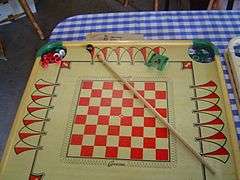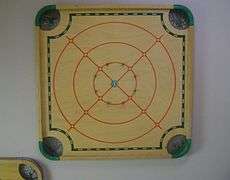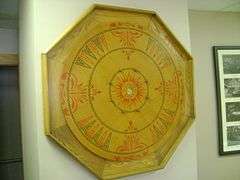Carrom Company
Formerly called | Novelty Company |
|---|---|
| Industry | games |
| Founded | 1889 |
| Founder | Henry L. Haskell |
| Headquarters | Ludington, Michigan |
Area served | United States |
| Products | Games, furniture |
| Brands | Carrom |
| Services | manufacturer |
Carrom Company (also Carrom Industries) was a manufacturer of games and furniture, headquartered in Ludington, Michigan. It started as Ludington Novelty Company in the nineteenth century. Its main product was the game of Carroms. The game was sold in the United States by the tens-of-thousands starting at the end of the nineteenth century.
Beginnings (1889–1900)
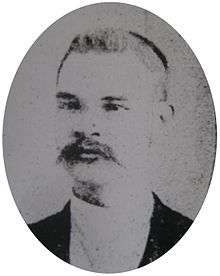
Henry L. Haskell started the Ludington Novelty company in 1889. It made baskets and games. The names of the very first games of "Novelty" are unknown. Haskell was a Sunday school teacher at this time. He was concerned that young boys were loitering around pool halls too much and influenced with bad habits.[1] He then invented a game board in 1892 for home entertainment, that the whole family could play.[2] Haskell called the game "carroms" and it was played on a carrom board that he patented.[1] An 1895 newspaper advertisement said that to get the boys to stay home, provide for them the carroms game to play with.[3]
As the public showed interest in Haskell's game, he then went about marketing his game board. The carrom game boards were made first by hand in 1892.[4] At that time a game board was made and sold before another was started. Haskell convinced his friend John A. Mitchell to invest in his game venture in 1893.[4] Mitchell invested a thousand dollars into Haskell's new enterprise. Mitchell's brother Chauncey also invested into Haskell's game board enterprise and the Ludington Novelty company. In 1893, production from this company was about ten game boards per day and approximately 2,500 were produced in the first year. The boards were made by hand with assistance of crude machinery from a planing mill of Ludington partly owned by Haskell.[5] The game sold by the tens-of-thousands in the United States before the nineteenth century ended.[6] Haskell's Carrom game was marketed from Ludington and introduced to ten states by 1901 through their traveling salesman Eugene C. Allen.[4]

Haskell patented the carom game-board (USD27788S) on October 26, 1897. His new invention became first popular in the United States and then spread throughout the world. An 1898 advertisement for the game of CARROMS in a Ludington journal used the slogan A little nonsense now and then is relished by the wisest men. The ad went on to say that a fascinating way of nonsense was through the best parlor game made – CARROMS. The advertisement makes note that it was patented on October 26, 1897 and that other associated patents were pending. It said to get a catalog of the CARROMS products to make a request to Ludington Novelty in Michigan.[7]
Associated patents
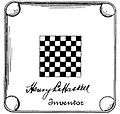 Game board 1897 patent
Game board 1897 patent Carom back stop board
Carom back stop board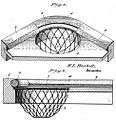 1900 corner-pocket patent
1900 corner-pocket patent Carom game-piece rings
Carom game-piece rings Carom spring cue shooter
Carom spring cue shooter
Early history (1900–1915)

Justus Smith Stearns, a local businessman, bought part of the company in 1900 and took over management of the Carrom company. The company prospered under the Stearns leadership. Other products were added to the game line, like the carrom folding card tables and other furniture. The Carrom games and products were sold throughout the United States by the thousands.[1]
John Mitchell was the president of Ludington Novelty Company in 1901 and his brother Chauncey E. Mitchell was the treasurer. Haskell was the secretary of the company at this time. Production had increased to six hundred Carrom games per day. They employed 95 men, 85 women, 14 girls, and 8 boys.[8] The string pockets for the four corners of the Carrom game board for collecting the ring "strikers" were made by local Ludington housewives and provided extra income for them.[9] See 1900 corner-pocket patent US648561.
Novelty company bought out the game manufacturer Archarena Company of Peoria, Illinois in 1902 and they merged together. Archarena was founded by Charles C. Harper and Edgar L. Williams. Harper was a clerk for Aetna Fire Insurance Company at the time. Williams had patents on 4 game boards associated with Archarena. The company then became the Carrom-Archarena company and manufactured Carrom game boards by the thousands. The company was one of the largest employers of Ludington, Michigan in the early 1900s. The Carrom-Archarena company became Carrom Company in 1912 and sold the game also to other countries of Europe and Asia in addition to the United States.[4][6]
Mid history (1916–1939)

In 1916 Haskell obtained the building at 801 N. Rowe Street in Ludington. The three story brick building is 60 feet wide and 300 feet long and was used previously by the manufacturer of pianos. From this building he made his carrom game boards. In 1917 the new Haskell Manufacturing Company was formed from the Carrom company. The Carrom-Archarena company became part of the Haskell company and worked out of this building. There were additionally other Haskell owned companies working out of this building from 1917 under the Haskell company. Another one was the Haskell Boat Company.[10] They made the Haskell canoe from one piece of plywood that used a secret waterproof glue Haskell invented.[11][12] The Haskell canoe was made with rigid exterior molds of concrete and inflated interior bags to shape it.[13]
The Haskelite Manufacturing Company built a second factory plant in Grand Rapids in 1918 which became the Haskelite Manufacturing Corporation.[14] The U.S. government helped financed this plant and initially owned it. Haskell had the right to buy the building back from the government at a later date. This plant was an important contributor to the efforts of World War I. It produced plywood for the construction of 3,000 military airplanes for the United States and its allies.[15] Some of the plywood sheets of Plymold for making these airplanes were 12 feet wide by 50 feet long.[16] The Carrom company received from Haskell and J. W. Beiger in 1926 the shop rights to the original blood-albumen glue they patented.[17] The company prospered and expanded through the 1920s. Haskell was with the company until 1930.[4] It had some financial set-backs in the 1930s because of the general poor economy of the United States. It was reorganized and renamed, becoming Carrom Industries in 1939.[18]
Later history (1940–1966)

Haskell died on April 3, 1940. In 1942 the Carrom Company was sold by Stearn's grandson to William Ross of Milwaukee. Ross sold the company in 1950 to Lee Smith. Smith retired from the company in 1960. In April 1961 three key employees of the company resigned and started up their own company to market games. These were William J. Mueckler, Robert Erickson, and Albert DelZoppo and from the first letters of their last names came their company name, Merdel Game Manufacturing Company.[4]
Carrom Company (also known as Carrom Industries[19]) was bought out by Shampaine Industries in 1951. Shampaine Industries was headquartered in St. Louis and made furniture for institutions. Carrom division in Ludington became a fractional part of their total business. The total sales of Carrom game-boards were estimated at over 4,000,000 by 1952 for the first 63 years of making them.[1] Journal Wood Working Digest estimated 5,000,000 had been sold by 1958.[20] By the 1980s the Carrom company was selling between 80,000 and 100,000 game boards per year through various toy and department stores.[6]
The Merdel Games Manufacturing Company of Ludington formed in 1961 manufactured their own version of the well known game. It was sold under the name "Carom" (single "r"). There was a lawsuit filed against Merdel Corporation by Shampaine Industries in 1961 for copyright infringement, as the original game was CARROMS with double "RR"s. This lawsuit was ultimately dropped and dismissed on February 28, 1967.[21]
Latest history (1967–1999)
Affiliated Hospital Products company acquired Shampaine Industries in mid-1967, that included the Carrom Games with the registered trade mark of "Carrom" with the double "r" in the name. The company became one branch part of their seven divisions.[2] Affiliated Hospital Products made mostly furniture for hospitals. The Carrom Games division, a fraction of their total sales, moved production of their toys and games in 1968 to Red Lion, Pennsylvania for a short time. They continued to make the game of CARROMS and competed against the "Carom" game of Merdel Manufacturing.[22][23]
There was a lawsuit filed against Montgomery Ward & Company in 1969 by Affiliated Hospital Products, owner of the original CARROMS game. The lawsuit alleged that Montgomery Ward's Christmas catalog and newspaper ads misrepresented the "Carroms" name by marketing a similar product made by Merdel with the name "Carom" with one "r" to mislead the public. The lawsuit said the Montgomery Ward salespeople were representing to the public that what they were buying was that of the genuine original product of CARROMS, which was not correct. The stores were in fact selling the copied reproduction of the game that was being made by Merdel Manufacturing and sold for a cheaper price than the game from original Carrom Company.[22][23]

The Carrom games branch of the Affiliated Hospital Products company was then moved in the first part of 1972 to Sardis, Michigan. They shut down totally later in 1972 and that part sold to Merdel Manufacturing Company of Ludington. Merdel then began marketing the game with double "RR's" in the name, since they then legally owned all the rights to the game. Merdel Manufacturing was acquired in 1981 by the Lightning Guider sled company of Duncannon, Pennsylvania. Merdel bought game manufacturer William F. Drueke & Sons company of Grand Rapids, Michigan, in 1992 for just under a half million dollars.[24] Merdel company was attracted to the Drueke company because they manufactured parts and boards to family oriented games like backgammon, checkers, cribbage, and chess.[24] It was at one time in the twentieth-century the only domestic manufacturer of chess sets, but in the twenty-first century the company fell into financial difficulties because of competition and nearly went out of business.[24]
The Drueke company, along with its employees and equipment, was merged into the game division of Merdel Manufacturing Company in Ludington after Affiliated Hospital Products company acquired it.[24] Merdel changed back to the original name of "Carrom Games" with the two "RR"s in 1994.[25] The Carrom games branch of the Affiliated Hospital Products company then bought out in 1996 what remained of Recreational Products that had gone bankrupt. It moved its production of their air hockey game, pool tables and other works to Ludington. That part created the Carrom Sports branch division of Affiliated Hospital Products.[26]
Copies and reproductions
There were several companies that made copies of Haskell's Carrom game board. The Transogram company made a version of Haskell's game board in the 1950s and called it Skooker.[27] Coleco in the 1980s made reproductions and they had names like "Carom-playing Games Board" with up to 202 derived replication games.[27] Some variants in the 1970s were called "101 Games Board" and "Carom-playing 166 Games Board."[27] An ice-box manufacturer made "Combinola" and "Crokinola" boards as variants of the game.[27]
Vintage Carrom game boards
References
- 1 2 3 4 Williams, Leonard P. (December 22, 1952). "Carrom Industries / from Lumber to Game Boards". Daily News. Ludington, Michigan – via Newspapers.com
 .
. The story is told that, back in the last quarter of the 19th Century, when Mr. Haskell was teaching a Sunday school class of boys in one of the local churches, he viewed with alarm the tendency of small boys to loaf around the pool halls of that day. His game of carroms is supposed to have been developed and produced to help provide wholesome entertainment for young people in their homes and away from places where they might come under questionable influences.
- 1 2 "Carrom Company Is Diversified". Daily News. Ludington, Michigan. September 3, 1965. p. 13 – via Newspapers.com
 .
. - ↑ Petersen, Dave (June 10, 2016). "Have You Seen It?". Daily News (p. A4). Ludington, Michigan.
- 1 2 3 4 5 6 Cabot, James L. (February 12, 1990). "History of Carrom makers is Interesting". Daily News. Ludington, Michigan.
- ↑ Cabot, James L. (February 27, 1990). "My Turn – Carrom source material origins". Daily News. Ludington, Michigan.
- 1 2 3 "Carrom – king in Ludington". Daily News (page 1). Ludington, Michigan. February 5, 1988 – via Newspapers.com
 .
. - ↑ "Ludington Novelty Works". Epworth Assembly Quarterly. Epworth Association. IV (1). April 1898.
- ↑ "A Home Institution". Ludington Record (p 1). Ludington, Michigan. January 17, 1901.
- ↑ "What Industry Means To This Community / Carrom" – via Newspapers.com
 .
. - ↑ Saarinen 2006, p. 257.
- ↑ FMA 1917, p. 204.
- ↑ Day 1922, p. 69.
- ↑ NatHardMag 1948, p. 64.
- ↑ MichMan 1918, p. 42.
- ↑ Dunbar 1955, p. 439.
- ↑ Motorboating 1946, p. 108.
- ↑ Smith 1930, p. 19.
- ↑ "Industry on Parade". Daily News. Ludington, Michigan. December 22, 1952 – via Newspapers.com
 .
. - ↑ "Ludington Machine and Tool". Daily News (p. 1). Ludington, Michigan. January 29, 1953 – via Newspapers.com
 .
. - ↑ Ward 1958, p. 61.
- ↑ "Federal Court Dismisses Suit Against Firm". Daily News. Ludington, Michigan. March 3, 1967 – via Newspapers.com
 .
. - 1 2 "Carrom / Our Story – Over 100 years in the making".
- 1 2 "File suit against Firm for "Carrom" Infringement". Daily News. Ludington, Michigan. December 9, 1969 – via Newspapers.com
 .
. - 1 2 3 4 Heaney, D. Michael (July 15, 1992). "Merdel-Carrom makes Bold Move, brings Drueke games to Ludington". Daily News. Ludington, Michigan.
- ↑ "Carrom Company". 2015. Retrieved May 8, 2016.
- ↑ "Best Quality Toys". Carrom History. Best Quality Toys, Muncy Valley, PA. 2015. Retrieved May 24, 2016.
- 1 2 3 4 Lonsway, Brian (1998). "THE AMERICAN CARROM GAMEBOARD – SOMETHING FOR EVERYON". The Big Game Hunter. Retrieved May 24, 2016.
Sources
- Day, Thomas Fleming (1922). The Rudder. Fawcett Publications.
- Dunbar, Willis Frederick (1955). Michigan Through the Centuries. Lewis Historical Publishing Company.
- FMA (1917). Furniture Manufacturer and Artisan. Grand Rapids Furniture Record Company.
- MichMan (1918). Michigan Manufacturer & Financial Record.
- Motorboating (January 1946). Motorboating – ND.
- NatHardMag (1948). National Hardwood Magazine.
- Saarinen, Eero (2006). Eero Saarinen: Shaping the Future. Yale University Press. ISBN 0-9724881-2-X.
- Smith, S.H. (1930). Veneers and Plywood. S.H. Smith.
- Ward, Darrell (1958). Wood Working Digest / Keep-em playing with CARROM games. Hitchcock Publishing Company.
External links
| Wikimedia Commons has media related to Carrom Company. |

